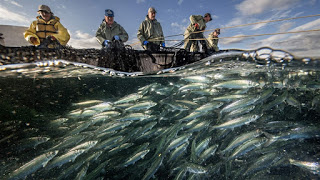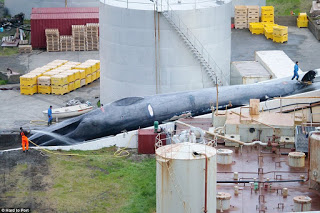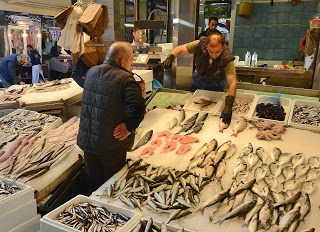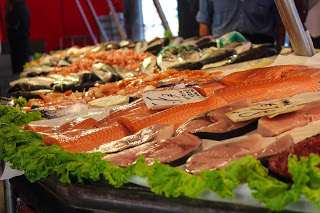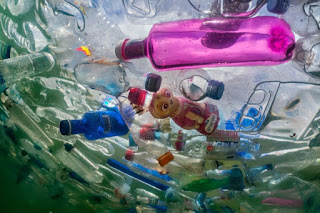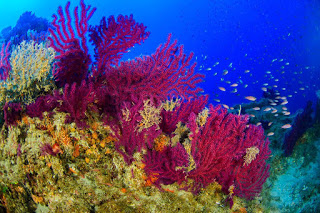1. House Passes Bill Unravels Standing Ocean Protection Act
2. Whalers are Accused of Killing Rare Blue Whale – First of its Kind to be Harpooned in more than 50 Years
Icelandic whalers appear to have killed an endangered blue whale before marketing it to be eaten as a delicacy in Japan. Photos of the massive mammal, which can grow to 33 meters long, were posted online by conservation groups claiming it was slain by Kristján Loftsson’s whaling company. The huge carcass was seen being hauled into port by the Hvalur 8 ship while tied to the side of the vessel before being dragged on to the dock on Saturday evening. Blue whales were almost hunted to extinction last century and there are only 10,000 to 25,000 left alive. One has not been slaughtered for more than 50 years.
 Hong Kong, the global illegal shark fin trading hub, seized more than 1,263 kilograms of Oceanic whitetip shark fin in 2017 and 1,382.7 kg of Hammerhead shark fin, lawmakers were told today. The seizures by Hong Kong Customs exceeded that of 2016. The shipments seized in 2017, came from India, Egypt, Peru, Kenya, Senegal, Guatemala, Indonesia, Somalia, and the United Arab Emirates. Lawmaker Martin Liao notes in a question to the Environmental Secretary, Wong Kam-Sing that Hong Kong is the world’s largest trading center for shark fins. Food products made from of as many as 76 shark species are on sale in the local market, with nearly one-third of them belonging to endangered or vulnerable shark species.
Hong Kong, the global illegal shark fin trading hub, seized more than 1,263 kilograms of Oceanic whitetip shark fin in 2017 and 1,382.7 kg of Hammerhead shark fin, lawmakers were told today. The seizures by Hong Kong Customs exceeded that of 2016. The shipments seized in 2017, came from India, Egypt, Peru, Kenya, Senegal, Guatemala, Indonesia, Somalia, and the United Arab Emirates. Lawmaker Martin Liao notes in a question to the Environmental Secretary, Wong Kam-Sing that Hong Kong is the world’s largest trading center for shark fins. Food products made from of as many as 76 shark species are on sale in the local market, with nearly one-third of them belonging to endangered or vulnerable shark species. ———————————————–
Ediotorial Note: A similar farmed salmon breach happened last year in Canada: Read more here…
As more countries depend on fish to feed their growing populations, waste from fishing operations is soaring, raising concerns over the sustainability of current fishing operations around the world. A third of the world’s fish stocks are overfished and about 35 percent of fish caught for food are never eaten. It’s predicted that hotter temperatures around the world will also drive fish away from warm tropical waters, where nations rely on seafood, according to a report released Monday by the Food and Agriculture Organization (FA0) of the United Nations.
———————————————–
9. Hong Kong’s Chinese White Dolphin Numbers Remain Critically Low
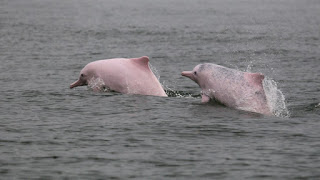 The number of Chinese white dolphins in Hong Kong waters remains “critically low”, according to a new government report, with experts worrying that future reclamation and construction could lower it further. Just 47 of the pink sea mammals were spotted from April 2017 to March 2018, according to the latest report by the Agriculture, Fisheries and Conservation Department. That is the same number as the local population sank to in 2016-17, the lowest since records began in 2003. There were 188 in 2003. That number plunged to 87 in 2014-15, and 65 in 2015-16.
The number of Chinese white dolphins in Hong Kong waters remains “critically low”, according to a new government report, with experts worrying that future reclamation and construction could lower it further. Just 47 of the pink sea mammals were spotted from April 2017 to March 2018, according to the latest report by the Agriculture, Fisheries and Conservation Department. That is the same number as the local population sank to in 2016-17, the lowest since records began in 2003. There were 188 in 2003. That number plunged to 87 in 2014-15, and 65 in 2015-16.
11. Divers Find Stunning Coral Forests Around Sicily’s Underwater Volcanoes
The Aeolian Islands north of Sicily are volcanic islands surrounded by waters filled with underwater volcanoes. The UNESCO World Heritage Site is a popular tourist destination, but the waters around them haven’t received much attention from researchers. That was until Oceana, an international organization devoted to protecting and restoring the oceans of the world, launched a one-month expedition into these waters. Exploring seven different areas around the Aeolians, Oceana researchers found many types of coral, some of them critically endangered, and habitats shared by a variety of sea creatures, including sharks and loggerhead turtles.

